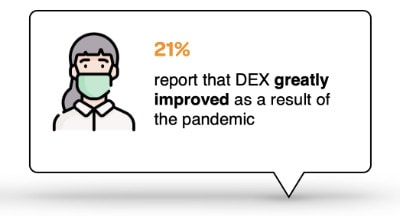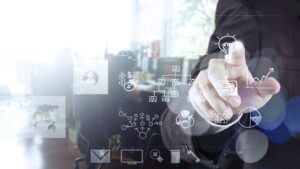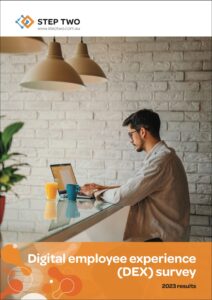
Filed under: Digital employee experience
 Digital employee experience (DEX) considers all of the digital interactions that happen within organisations, whether it’s employees using corporate-provided technology or working digitally with each other.
Digital employee experience (DEX) considers all of the digital interactions that happen within organisations, whether it’s employees using corporate-provided technology or working digitally with each other.
There’s no question that the pandemic has delivered an extraordinary acceleration in the pace of workplace change, with the sudden switch to digital-only remote working for many employees. The size of the change is confirmed by the results of the 2021 DEX survey, conducted by Step Two.
In the survey, 21% of respondents reported that DEX has greatly improved as a result of the pandemic, with 56% saying it has somewhat improved. Added up, that’s an overwhelming 77% who say that DEX in their firm is better than a year ago.
In our work as a consultancy, we’ve seen most of our clients rapidly adopt tools such as Zoom, Microsoft 365 or Workplace by Facebook. In the survey, 40% of respondents say there is a single productivity and collaboration platform across their whole organisation, with 30% saying that multiple solutions have been deployed.
With these tools in place, meetings that used to be held in person were suddenly switched to online, and team collaboration rapidly proliferated. We’ve all discovered that it’s entirely possible to work remotely, outside of the office setting.
While it’s one thing to roll out these powerful new tools, it’s another to use them effectively and to extract the greatest value from them. This is where we see that only half of the change journey has happened in many firms. In most cases, previous behaviours have merely been transplanted into the online space. Days are still packed with meetings, now held online instead of in person, rather than replacing these meetings with more productive uses of new tools.
It’s no doubt for this reason that 63% of respondents indicated that digital literacy is extremely or very important. That being said, 65% also said that digital literacy is mixed or highly variable. Only 19% said that digital literacy is consistently high or very high.
This shows that much work is yet to be done, with digital workplace practitioners leading the way.
In our work, we’re helping our clients use our “wave” methodology for gaining more meaningful adoption of new tools, structured around common scenarios of use. A more strategic approach to platforms such as Microsoft 365 will also be required, to give an unambiguous signal that change is necessary and important.
Working effectively with others using digital tools is a key element of digital employee experience, and every bit as important as the digital workplace and intranet solutions that we deliver. Let’s renew our focus on fostering lifelong learning within the workplace, with digital literacy at its core.
(Download the free 2021 DEX survey whitepaper to see the rest of the results, across every aspect of digital employee experience.)





